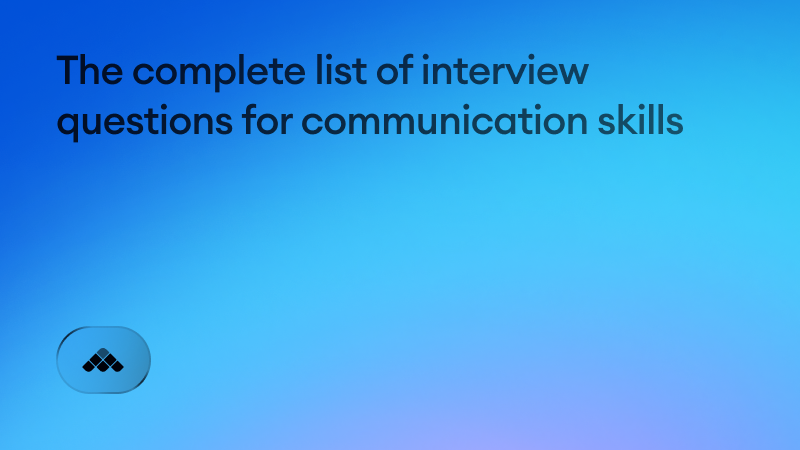Communication is one of the most universal skills to evaluate during interviews. Whether a candidate is collaborating with teammates, presenting ideas to leadership, or interacting with customers, their ability to express themselves clearly and listen effectively will shape their success.
To help you make informed decisions, we’ve compiled a complete list of the best interview questions for communication skills. They'll help you decipher a candidate’s ability to listen actively, speak clearly, adapt their style to various audiences, and flex between different communication modalities.
These questions are crucial to uncover how candidates share ideas, process feedback, and connect with others.
Key takeaways
- Communication skills are fundamental to a high-functioning organizational environment.
- Evaluate these skills via sub-competencies including clarity, adaptability, conflict resolution, and written communication.
- While you may prioritize specific factors, there are key markers of strong communication that can be the difference between hire and no hire.
Why assess candidates' communication skills in interviews
Good communication skills lay the foundation for a well-functioning work environment. They keep collaboration running smoothly and prevent time-wasting misunderstandings.
Employees who can explain complex concepts simply, adapt their style to different audiences, and listen actively contribute to smoother collaboration and faster problem-solving.
On the other hand, poor communication skills can sabotage strong teamwork, hinder an employee's impact, and reduce productivity.
By carefully evaluating communication during interviews, you not only hire people who can do the job—you also strengthen your organization’s ability to collaborate and innovate at scale.
The best interview questions for communication skills
- Explain how you break down complex information for easier understanding.
- Give me an example of a time when you had to explain a complex concept to an audience with little to no background knowledge of the topic.
- Can you think of an example when you overcomplicated a message and it had a negative impact on what you were trying to achieve?
- Can you give me an example of a time you had to deliver bad news to a client or stakeholder?
- Think of a time when you had to deliver the same message or presentation to multiple groups of people. How did you adjust your communication style or communication channel to account for the nuances of each audience?
- Can you think of a time when your communication style hindered your message from landing well with your audience? What would you have done differently?
- Can you share an example of a conflict you were involved in at work and how you handled it?
- How do you handle working with someone who is difficult or challenging?
- Describe a situation where active listening helped you solve a problem.
- Tell me about a time you clarified a misunderstanding in the workplace.
- Tell me about a time you used your written communication skills to persuade an important stakeholder.
- Imagine a big customer has emailed you negative feedback on your company’s product and customer service. How would you go about composing an email in response?
- In what situations do you think written comms are a more effective tool than verbal communication? (e.g., an in-person meeting, or phone/video call)
Competencies to look for
Communication skills can take many forms: written, oral, internal, external, persuasive, informative. When evaluating communication skills in the interview process, it can be helpful to focus on a few key sub-competencies to make sure a candidate has a well-rounded communication skillset.
1. Clarity and simplicity
One of the most crucial communication skills is the ability to convey complex ideas in simple, easily understandable terms. Whether it’s a software engineer needing to explain technical concepts to a legal team, or a marketer distilling complex product functionality to end-users, simplifying intricate concepts is a must-have for effective communication.
Questions to test a candidate's clarity of communication:
- Explain how you break down complex information for easier understanding.
- Give me an example of a time when you had to explain a complex concept to an audience with little to no background knowledge of the topic.
- Can you think of an example when you overcomplicated a message and it had a negative impact on what you were trying to achieve?
What to look for in responses:
Dig deep into your candidate's specific examples. They should be adept at making strategic judgments on what an audience needs to know, and what can be left out. Look for evidence of candidates simplify complex ideas through analogies, visual aids, or real-life examples.
Empathy is also important to consider here. What specific tactics has the candidate used to better understand their audience? How do they then use that information to adjust their communication style and content accordingly?
Make sure they know how to think about the audience's perspective and take that into consideration when crafting communications.
2. Adapting communication styles
Adapting communication style to suit different audiences and situations is a fundamental skill to build positive relationships and influence key stakeholders. Interview questions designed to assess this skill should focus on a candidate’s capacity to listen actively and demonstrate empathy.
Questions to test a candidate's ability to adapt communications:
- Can you give me an example of a time you had to deliver bad news to a client or stakeholder?
- Think of a time when you had to deliver the same message or presentation to multiple groups of people. How did you adjust your communication style or communication channel to account for the nuances of each audience?
- Can you think of a time when your communication style hindered your message from landing well with your audience? What would you have done differently?
What to look for in responses:
Look for evidence that the candidate avoids a one-size-fits-all approach to communication. They should clearly explain 1) how they seek to understand different audiences’ needs, and 2) how they use that information to adjust their communication style effectively.
Challenge the candidate to reflect on situations when they had to put themselves in someone else’s shoes. This tests their empathy and curiosity. Look for examples of active listening, identifying common ground, and respecting differing viewpoints.
Non-verbal communication, emotional intelligence, and body language also play a role in painting a picture of a candidate's communication skills. Bonus points if a candidate mentions how these factors play into their communication approach.
You can also get a read on non-verbal communication through your own interactions with the candidate throughout the interview process.
3. Conflict resolution
Questions about conflict resolution help assess a candidate’s ability to handle disagreements, manage difficult conversations, and find solutions while maintaining composure. These types of interview questions evaluate qualities such as collaboration, active listening, and the ability to facilitate open dialogue.
Interview questions specific to conflict resolution:
- Can you share an example of a conflict you were involved in at work and how you handled it?
- How do you handle working with someone who is difficult or challenging?
- Describe a situation where active listening helped you solve a problem.
- Tell me about a time you clarified a misunderstanding in the workplace.
What to look for in responses:
The candidate should give their undivided attention and actively listen when they're in a conflict, rather than simply trying to get across why they think they are “right". They should be able to demonstrate how they've created environments where others involved are free to communicate their point of view.
The candidate should have a demonstrated history of persuading others in a conflict to rally around a solution forward. Look for leadership and initiative in their approach to conflict resolution that proves they can bring others along with them towards solutions.
4. Excellent written communication
Especially as work becomes increasingly asynchronous, written communication skills are just as important as verbal ones. Whether it’s emails, proposals, reports, or customer service inquiries, effective written communication is crucial.
Interview questions to test written communication skills:
- Tell me about a time you used your written communication skills to persuade an important stakeholder.
- Imagine a big customer has emailed you negative feedback on your company’s product and customer service. How would you go about composing an email in response?
- In what situations do you think written comms are a more effective tool than verbal communication? (e.g., an in-person meeting, or phone/video call)
What to look for in responses:
In candidates’ answers, keep an eye out for concrete examples of the impact they’ve been able to achieve through their written communication abilities. Probe their process and how craft effective written work.
What factors do they take into consideration? Do they naturally bring up how they assess the efficacy of their written communications?
You should also ensure that they have a strategic framework for deciding what forum and mode of communication will be most effective for achieving their goals.
They should have insights to back up how and why they choose to deliver their message in a certain way.
Assess communication skills on evidence, not vibes
Communication skills should never be left to guesswork or first impressions. By using structured questions and listening for specific behaviors, you can consistently identify candidates who excel at expressing themselves and working effectively with others.
Use the interview questions above to evaluate candidates in a fair and consistent way, and you’ll be well positioned to build teams that thrive on clear, collaborative communication.
If you want the tools to conduct structured interviews easily, try Metaview for free.


